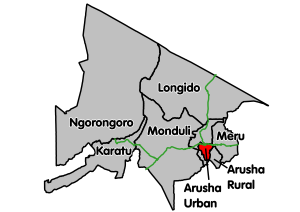Arusha City Council, Arusha
Arusha Urban District | |
|---|---|
 Arusha Urban District's location within Arusha Region | |
| Coordinates: 03°22′21″S 36°41′40″E / 3.37250°S 36.69444°E | |
| Country | Tanzania |
| Region | Arusha Region |
| Population (2012) | |
| • Total | 416,442 |
Arusha Urban District (or Arusha City Council) is one of the seven districts of the Arusha Region of Tanzania, and it contains the regional and economic capital; the city of Arusha. It is bordered to the south, west and north by Arusha Rural District and to east by Meru District. As of 1994, Arusha District was the wealthiest district in Tanzania with 91,024 Tanzanian shillings.[1]
As of 2002[update], the population of the Arusha District was 282,712.[2]
According to the 2012 Tanzania National Census, the population of Arusha Urban District was 416,442.[3]
Transport
Paved Trunk road T2 from Kenyan border crossing at Namanga to Moshi passes through the Arusha Urban District and paved trunk road T5 from Babati ends in the district.[4]
The Usambara Railway from Tanga to Arusha ends in the district as well.
Arusha Airport is also located within the district's boundaries.
Administrative subdivisions
As of 2012, Arusha Urban District was administratively divided into 19 wards, three divisions and one constituency.[3]
Constituencies
For parliamentary elections, Arusha Region is divided into constituencies. As of the 2010 elections Arusha District had one constituency, Arusha Constituency.
Divisions
- Elerai
- Suye
- Themi
Wards
|
|
Sources
References
- ^ Grawert, Elke (2009). Departures from Post-Colonial Authoritarianism: Analysis of System Change With a Focus on Tanzania. Peter Lang. p. 171. ISBN 3631574673. Retrieved September 3, 2012.
- ^ "2002 Population and Housing General Report: Arusha: Arusha". Archived from the original on 18 March 2004.
- ^ a b "Census 2012". National Bureau of Statistics. Archived from the original on 5 March 2016. Retrieved 5 May 2016.
- ^ "Arusha Roads Network" (PDF). Tanroads. Archived from the original (PDF) on 3 November 2016. Retrieved 5 May 2016.
- ^ In English, the Swahili "Daraja Mbili" means two bridges.
